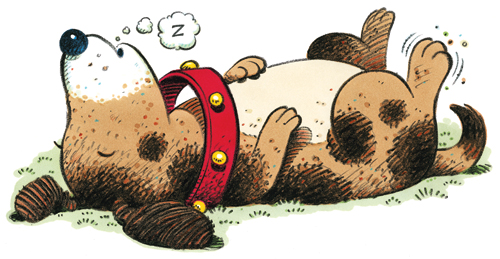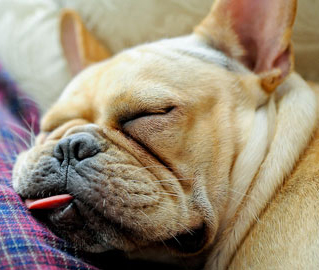
While that sweet little sniffle occasionally escaping from your pet as they doze off into their own four-legged dream world is just too cute for words sometimes, a grizzly bear growl holding you hostage at 3am is not a Kodak moment for either of you. In addition to providing your pet with quaility pet ID tags, it is also our goal to help educate pet owners in ways that can improve their relationship with their furry friend. That sometimes adorable, other times annoying sound is caused by an obstruction in the nasal passage or nostrils just as it is for humans that leads to airway obstruction, making it difficult for a pet to breathe easily. Called brachycephalic syndrome, it’s a little cue from your pet to you that something could be terribly wrong.
Below we list a few of the common causes of pet snoring as well as tips to help prevent it in the future:
Causes of Pet Snoring:
Overweight/Not Enough Exercise: It is common for pets with a little extra weight to develop excess tissue in their throat along with their body weight which causes an obstruction in their airway and hence a sniffle, snore or wheezing noise when your pet rests or exercises.
Nasal Allergies: Allergies are different for each pet just as they are for us humans, ranging from seasonal weed pollens to specific foods. A pet’s nasal allergies cause mucus to build up in their snouts, blocking the air they breathe from passing through smoothly and causing heavy, loud breathing.
Breed: There are several dog breeds that are simply more predisposed to snoring such as Pekinese, Pugs, Boston Terriers, Shih Tzus, Chow Chows and really any dog with a broader, thick head and shorter muzzle.
Tobacco Smoke: A known irritant to pets and humans, tobacco smoke effects animals just as it does humans and other than problems in their ability to breathe easy, can lead to various forms of cancer.
Cold Weather: Chilly weather creates stuffy noses and is a simple cause of airway obstruction for your pet.
Ways to Help Prevent Pet Snoring:
| There are various tips to ensuring you and your pet get a good nights rest together. If it’s that time of year for ragweed and other common outdoor irritants to spring up, try cleaning your pet’s bedding more often and vacuum/clean your home regularly. It’s always good practice to walk your pet and exercise them daily to prevent any weight issues and ensure they’re stretching those legs and letting the sun kiss their sweet face. If it is allergen season, try to avoid areas with large amounts of weeds and woods close by. Always avoid smoking in your home to avoid passing on smoke-related irritants to your pet. |  |
If you have a breed that is more genetically likely to snore, there is a surgery for dogs to help curb those nasty breathing problems however it is typically done when they’re very young. Talk with your vet about other treatments to help get your little one back to feeling healthy, happy and grizzly bear-breathing free.
Be sure to celebrate your pup's new snore-free lifestyle with DogTagArt personalized pet tags!
| Tiffany Narron is the loving mama to her precious 9-year-old pooch Bella Blue. This past summer Bella started to snore something awful, keeping Tiffany awake for hours on end and making her one sleepless zombie of a mama. She looked into it along with her vet and discovered that Bella was in fact allergic to corn. She changed her diet to avoid that common ingredient and since has enjoyed many cozy nights snuggled safe and sound with her beloved Bella. |

